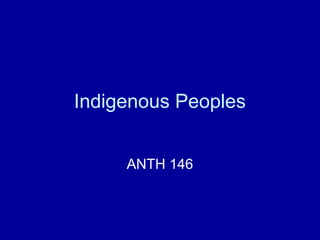
Anthro 146 indigenous peoples (1)
- 1. Indigenous Peoples ANTH 146
- 2. Terms • Indigenous peoples• Tribal / Tribal people • Genocide • Ethnocide • Terra Nullius • Social Darwinism • Imperialism • Economies and • Colonialism • Exchange
- 3. Indigenous People • claim their lands because they were the 1st or have occupied them since time immemorial • are groups that have been conquered by peoples racially, ethnically, or culturally different from themselves (Colonization, Westernization, Urbanization and the role of Nation State)
- 4. • Native peoples of the Americas share many parallels with indigenous peoples today • Indigenous peoples had no place in the making of the Nation-state.
- 5. Social Darwinism • Theory of social evolution • Based on Darwin’s theory of evolution • Scientific support for imperialism – Proved Western superiority – Justified imperialism in the name of progress.
- 6. Social Darwinism • Placed societies on an evolutionary framework • Hierarchy with indigenous and tribal peoples at the bottom and Western societies at the top • Natural order of things was for stronger, more advanced people to conquer and rule over weaker, more backward ones
- 7. • To overcome “backwardness” and indigenous society was urged to: • Abandon its traditional way of life • Abandon its language • Cease to exist as a separate society • Assimilate with the population
- 8. Ethnocide • Conquest of the indigenous peoples was justified – They were not fully human (no rights) – Need to civilize them – Development • Indigenous peoples stand in the way of development
- 9. • If indigenous peoples unwilling to assimilate • They undermine the State • Impede modernization
- 10. Economies • Definition: Making or getting a living • Production, Distribution, Consumption • Economic types: – Foraging, food-collecting → reciprocal exchange, mobile bands, consumption for survival • Horticulture, garden cultivation → redistribution by chiefs for prestige • Pastoralism → redistribution Agriculture → market exchange, private land ownership Industrialization – of goods and food →
- 11. Exchange • Exchange (distribution of goods) promotes social cohesion • Major types of exchange: – Reciprocity – Redistribution – Market
- 12. Reciprocity • Food collecting, small-scale societies • Egalitarian • Fosters long-term relations • Everyone taken care of moral economy • Redistribution • Centralized collection of surplus (food, goods, etc.) by chief • Redistribution through feasting – provides for all • Often competitive -- gain in status, prestige
- 13. Market Exchange • Buying/selling of commodities (even food) • Direct exchange of goods (barter) • Exchange through money
- 14. Nomads: Foragers/Pastoralists • Highly mobile • Inconvenient to nation-states • Straddle national boundaries • Disrupt the imaginary map of homogenous development
- 15. • Hunter and Gatherer • Pastoralists – Animal husbandry • Horticulturalists – Swidden agriculture / slash and burn
- 16. Indigenous cultures are not extinguished by natural laws but by political processes that are susceptible to human controls.
